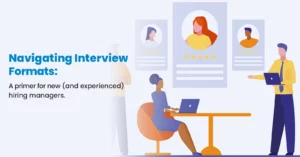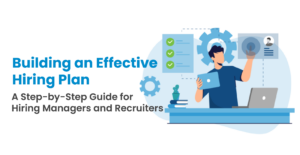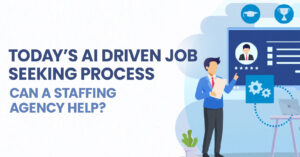Thirty-five years ago, the possibility of Artificial Intelligence gave rise to the worst type of science fiction fear: An independently thinking machine created to dominate and destroy human kind.
Now, over three decades later, AI has created a whole new slew of mini-Terminators, that to some talent professionals, are repeating the same mission in recruitment, with experts like Ray Kurzweil, Director of Engineering at Google, predicting robots will be smarter than us by 2029, a mere 10 years away.
Yet, somewhere between Hollywood drama, recruitment fears and expert predictions is the reality of Artificial Intelligence: It’s already here, and it’s changing the workforce along with the world – disrupting the way organizations attract, engage and retain talent.
The truth about Artificial Intelligence and talent
Ongoing developments in Artificial Intelligence (AI), robotics and machine learning have created technologies that can match or even outperform human ability. Automation, in particular, will become more prevalent as technology continues to complement human labour, eventually eliminating entire occupations that consist primarily of repetitive tasks.
Research from McKinsey Global Institute finds in advanced economies with relatively high wage levels, like France, Japan and the U.S., automation could displace 20 to 25 per cent of their workforce by 2030. Moreover, the global workforce can see up to 15 per cent, or 400 million workers, displaced by automation by the same year.
However, as talent continues to work alongside rapidly evolving technologies, existing occupations will change and new ones will be created– accounting for 10 per cent of new jobs by 2030, and organizations will need to redesign work to ensure that talent and technology can operate together effectively.
The impact of Artificial Intelligence on talent management
Is AI a friend or foe to recruiters? Although it’s true that the rapid development and adoption of Artificial Intelligence is displacing jobs and creating new ones that will require never-before-needed skills, machine learning and AI is ironically well on the way to lending a helping hand when it comes to solving the problems of human capital management.
Yet, while AI is touching everything from how employers define job requirements to candidate sourcing, screening and engagement in ways that were never before possible, technology will not eliminate the need for recruitment professionals or the trust that only humans can provide.
Instead, AI will provide exciting opportunities for recruiters and staffing firms to capitalize on the emerging technologies and bring human touches back to human capital management.
Trust will trump Artificial Intelligence
Trust is the greatest currency in recruitment. And it’s a result of many factors derived from a convergence of human connections: Outstanding candidates, reliable and transparent employers and experienced recruiters who use their interpersonal and emotional intelligence to bring the right people and opportunities together.
Trust, though potentially supported by powerful technology, exists independently of it, and so too, are the relationships that are built from forming human connections.
Technology will increase human connections
A successful recruitment process consists of 10 stages spanning the entire lifecycle — from the initial job intake to reviewing metrics after a hire is made. Within each if these stages, reside 72 tasks to be completed.
With AI replacing many of the repetitive tasks required throughout the hiring process, technology is creating the potential to improve productivity by enabling recruitment professionals to spend more time nurturing and deepening relationships with employers, job seekers, candidates and clients.
Humans must adapt to survive
AI will not eliminate the need for recruitment professionals; it will, however, change what they need to do in order to remain successful.
While this shift will require recruiters and recruitment teams to change the nature of how they work, the core function of talent acquisition will remain critical. This means upskilling or learning technical skills to guide the technology as well as developing the personal skills needed to create true human connections.
For business and talent leaders, this means it’s more important now than ever to provide strategic vision and guidance for their teams after technology takes away many of the repetitive tasks from the recruiting equation. Yet, change has many moving parts. And doing the right things the right way requires organizations to use their collective knowledge and experience to adapt.
The role of a staffing agency
Staffing firms have a role to play—both in meeting clients’ changing skills requirements and educating their candidates in the types of skills they should be investing in now to progress their careers in the future. Furthermore, a staffing agency must commit their resources to researching, vetting and implementing technologies and processes that create value to their clients, candidates, talent and partners.
A trusted partner is committed to advising its clients on the best solutions available to meet their business goals and deliver innovative services that transform how they acquire and manage talent.
Yet, human capital management isn’t the only industry disrupted by Artificial Intellegence. The retail industry’s global spending on AI alone, for example, is expected to grow to $7.3 billion per year by 2022. Canada is expected to lose around 100,000 farmers this year – making adoption of automation technologies a matter of survival to the agriculture industry.
Yet, with the implementation of AI technologies, organizations will have to attract and engage the right types of talent with the niche skills and experience needed to understand and work in collaboration with the technology. Staffing firms specializing in industry specific recruiting will have the necessary expertise, experience and relationships required to successfully place candidates in specific markets.
Being prepared for the rise of AI isn’t the only risk organizations face when managing a traditional or contingent workforce. If you’re interested in engaging contingent talent, or want deeper insights into how to manage the risks posed by your current program, download our free whitepaper: A Checklist for Contingent Worker Risk.
{{cta(‘203a6944-1c2c-4a10-ba3f-24c2ab35dbcb’,’justifycenter’)}}




